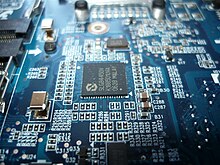Iṣẹ́ẹ̀rọ onítanná: Ìyàtọ̀ láàrin àwọn àtúnyẹ̀wò
No edit summary |
No edit summary |
||
| Ìlà 1: | Ìlà 1: | ||
[[Image:Power plant.jpg|thumb|Electrical engineers design complex power systems...]] |
|||
'''Ìmọ̀ iṣẹ́ẹ̀rọ onítanná''' (electrical engineering) (ati '''imo iseero ero-onina''' electronic engineering) je eka iseero to un se kika ati iwulo [[itanna]] (electricity), [[ero onina]] (electronics) ati [[isoninagberingberin]] |
|||
[[Image:Silego clock generator.JPG|thumb|...and electronic circuits.]] |
|||
'''Electrical engineering''' is a field of [[engineering]] that generally deals with the study and application of [[electricity]], [[electronics]] and [[electromagnetism]]. The field first became an identifiable occupation in the late nineteenth century after commercialization of the electric [[telegraph]] and electrical power supply. It now covers a range of subtopics including [[power engineering|power]], [[electronics]], [[control systems]], [[signal processing]] and [[telecommunication]]s. |
|||
Electrical engineering may include [[electronic engineering]]. Where a distinction is made, usually outside of the United States, electrical engineering is considered to deal with the problems associated with large-scale electrical systems such as [[Electric power transmission|power transmission]] and [[motor controller|motor control]], whereas electronic engineering deals with the study of small-scale electronic systems including [[computers]] and [[integrated circuits]].<ref>{{cite web | title = What is the difference between electrical and electronic engineering? | work = FAQs - Studying Electrical Engineering | url = http://www.ieee.org/portal/site/mainsite/menuitem.818c0c39e85ef176fb2275875bac26c8/index.jsp?&pName=corp_level1&path=education/faqs&file=faqs1.xml&xsl=generic.xsl | accessdate = 20 March 2012 }}</ref> Alternatively, electrical engineers are usually concerned with using electricity to transmit [[electrical energy|energy]], while electronic engineers are concerned with using electricity to process information. More recently, the distinction has become blurred by the growth of [[power electronics]]. |
|||
{{ẹ̀kúnrẹ́rẹ́}} |
{{ẹ̀kúnrẹ́rẹ́}} |
||
Àtúnyẹ̀wò ní 17:12, 12 Oṣù Kàrún 2012


Electrical engineering is a field of engineering that generally deals with the study and application of electricity, electronics and electromagnetism. The field first became an identifiable occupation in the late nineteenth century after commercialization of the electric telegraph and electrical power supply. It now covers a range of subtopics including power, electronics, control systems, signal processing and telecommunications.
Electrical engineering may include electronic engineering. Where a distinction is made, usually outside of the United States, electrical engineering is considered to deal with the problems associated with large-scale electrical systems such as power transmission and motor control, whereas electronic engineering deals with the study of small-scale electronic systems including computers and integrated circuits.[1] Alternatively, electrical engineers are usually concerned with using electricity to transmit energy, while electronic engineers are concerned with using electricity to process information. More recently, the distinction has become blurred by the growth of power electronics.

|
Àyọkà yìí tàbí apá rẹ̀ únfẹ́ àtúnṣe sí. Ẹ le fẹ̀ jù báyìí lọ tàbí kí ẹ ṣàtúnṣe rẹ̀ lọ́nà tí yíò mu kúnrẹ́rẹ́. Ẹ ran Wikipedia lọ́wọ́ láti fẹ̀ẹ́ jù báyìí lọ. |
Itokasi
- ↑ "What is the difference between electrical and electronic engineering?". FAQs - Studying Electrical Engineering. Retrieved 20 March 2012.
